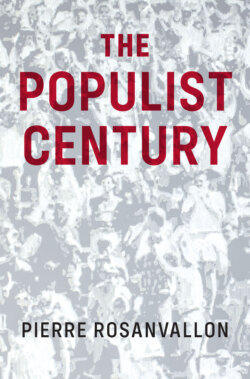Читать книгу The Populist Century - Pierre Rosanvallon - Страница 22
Notes
Оглавление1 1 Chantal Mouffe, The Democratic Paradox (London: Verso, 2000), p. 5.
2 2 Jean-Marie Le Pen, “Pour une vraie révolution française,” National Hebdo, September 26, 1985. Le Pen was marking his difference from the Maurrassian counter-revolutionary extreme right that jeered at the idea of democracy. His article also marked a turning point with respect to his own previous skepticism about “Churchillian democracy”: see his earlier manifesto, Les Français d’abord (Paris: Carrère-Lafon, 1984).
3 3 Le Pen, “Pour une vraie révolution française.”
4 4 See chapter 4, “Rendre le pouvoir au peuple,” in the programmatic text Le grand changement, with a preface by Jean-Marie Le Pen: Marcos-Antonio Cantolla-Iradi, Le grand changement: Et si on essayait le Front national? (Saint-Cloud: Front National, 1997).
5 5 See for example Yvan Blot, Les racines de la liberté (Paris: Albin Michel, 1985), chapter 8, “Le modèle Suisse,” and chapter 9, “Le recours: La démocratie authentique”; and Yvan Blot, La démocratie directe: Une chance pour la France (Paris: Economica, 2012).
6 6 Speech delivered February 26, 2017, at the Zénith, a large concert venue in Nantes; see https://www.leparisien.fr/elections/presidentielle/presidentielle-meeting-de-marine-le-pen-sous-tension-a-nantes-26-02-2017-6713349.php. At the time, Marine Le Pen was the target of several judicial investigations into the operations of her party, the Front National, focusing on the fact that individuals working for her within the party had been remunerated by the European Parliament.
7 7 See the emblematic article by Alain de Benoist, “Vers une juridictature,” Éléments, no. 178 (May–June 2019). In the same issue, see also the dossier titled “Les juges contre la démocratie: Pour en finir avec la dictature du droit”: https://www.breizh-info.com/2019/05/16/119033/les-juges-contre-la-democratie-elements-n-178/.
8 8 On this point, see my discussion in “The Election of Judges: Some Historical Facts,” in Democratic Legitimacy: Impartiality, Reflexivity, Proximity, trans. Arthur Goldhammer (Princeton, NJ: Princeton University Press, [2008] 2011), pp. 155–9.
9 9 The formula comes from Vladislav Surkov, a Russian businessman and politician who played the role of organic intellectual and spin doctor for Putin in the 2000s.
10 10 Carl Schmitt (1888–1985) was one of the great German legal scholars of the twentieth century. With his well-buttressed critiques of liberalism and the parliamentary system, he championed a realist vision of politics (defined as conflict between friends and enemies) and of a racist and unanimist conception of “the people.” His evolution toward National Socialism helped discredit his thought, but he was “rediscovered” in the 1980s by a far right seeking intellectual forerunners and by a far left fascinated by his anti-liberal radicality and his cult of force.
11 11 On this point, see Philippe Urfalino, “Un nouveau décisionnisme politique: La philosophie du populisme de gauche,” Archives de philosophie 82, no. 2 (2019): 291–312. We need to recall here that the critique of the “debating classes” has been a red thread running through the type of anti-liberal thought (which would be called far-rightist today) that went from Donoso Cortés through Maurice Barrès and Charles Maurras to Carl Schmitt. It is also the root of the anti-intellectualism that animated all these authors. For them, the logic of intellectuals had to defer to the instinct of the humble, the only force that expressed the proper relation to reality.
12 12 This definition is proffered explicitly by Alain de Benoist in The Problem of Democracy, translated from the French (London: Arktos, [1985] 2011).
13 13 Hugo Chávez, inaugural address, 2007, cited in Cas Mudde and Cristóbal Rovira Kaltwasser¸ Populism: A Very Short Introduction (New York: Oxford University Press, 2017), p. 17. (I have modified the translation slightly based on the original Spanish. Chávez cited these two sentences verbatim from an official communication sent by Simón Bolívar to the governing council in Magdalena, Colombia, on April 27, 1826. See Simón Bolívar, Doctrina del Libertador, prologue Augusto Mijares, ed. Manuel Perez Vila, 2nd edn. [Caracas: Biblioteca Ayacucho, 1979], p. 224. –Translator’s note)
